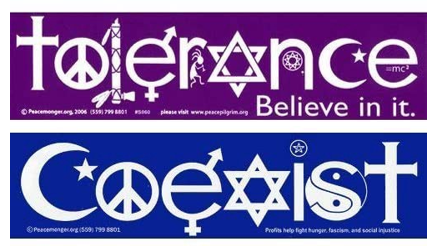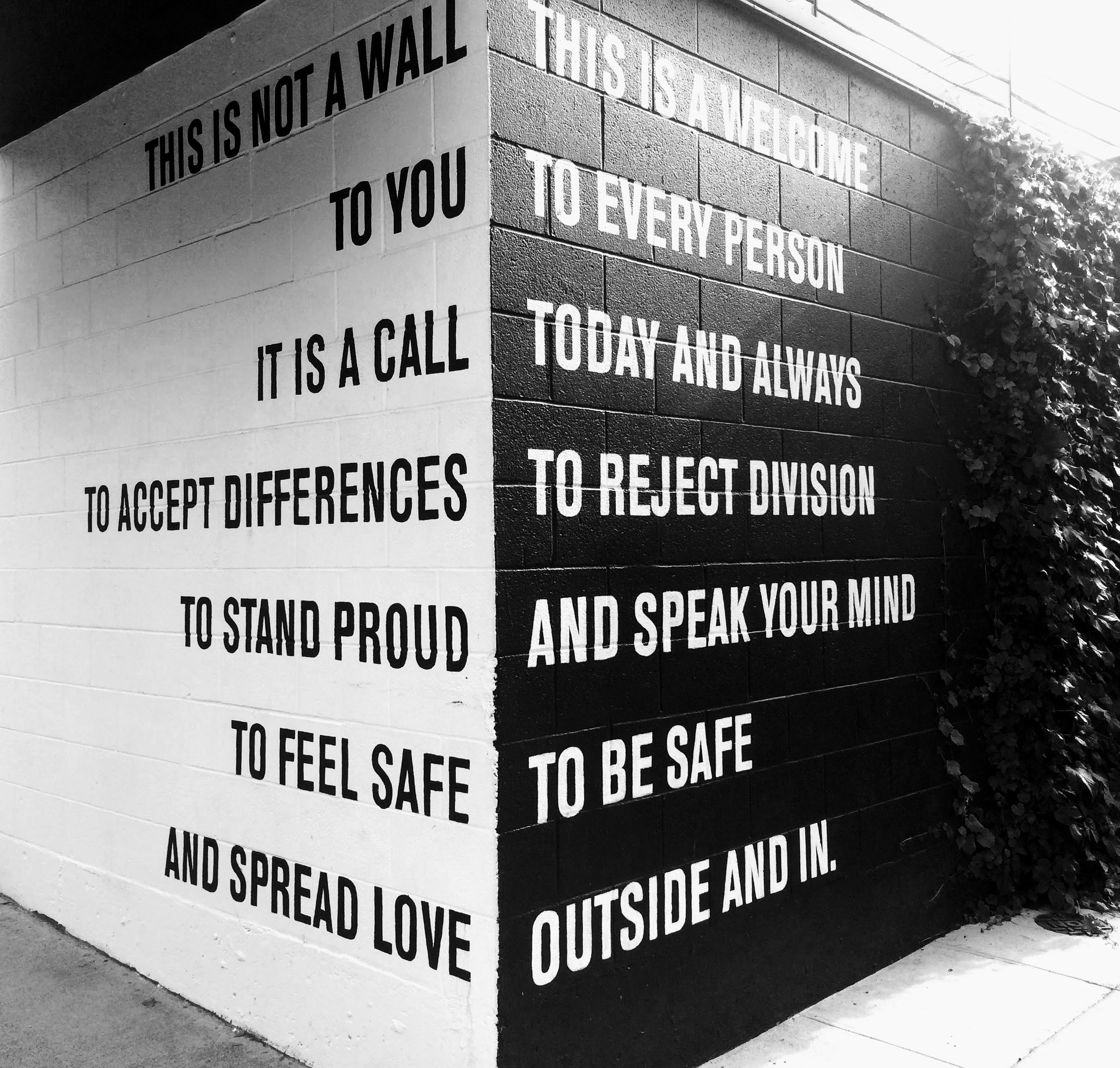Perhaps the term “Tolerance” itself holds a different meaning depending on culture and context. But, where I was raised, the term “Tolerant” carried with it a sense of “dealing with” something or “enduring” something or someone that was unpleasant.
“Will you PLEASE be quiet? I just can’t tolerate all the noise anymore!”
or
“Kaily is doing a great job tolerating her nagging little brother. He’s in his terrible-twos right now.”
Whether we’re aware of it or not, we are all, directly or indirectly, hindered by oppression and establishments that foster inequality. We’re either living within it, or it trickles down to us over time. That said, if I was personally living with the immediate burdens of oppression and inequality I’d clench my jaw and shake my head every time I heard or read or even saw the word “tolerance.”
I know that it may sound harsh but I feel that being “tolerant” of someone or someone’s views is patronizing at best; it’s condescending and downright rude at its worst.
Hearing or reading “tolerance” gives me an awkward feeling similar to one I might feel when I receive a forced apology. It’s not authentic. It’s not sincere. It’s not from the heart. Yeah…you apologized, but did you mean it? Someone expressing their “tolerance” of me would feel very much like that.
As someone who is rational enough to understand the intended sentiment of “tolerance,” I get it. Yes, I appreciate seeing the ubiquitous “Tolerance” bumper stickers. They go hand-in-hand with the “Coexist” stickers that express the same thing. We can exist…side by side. We can tolerate each other.

Just as I’ve written about Independence vs Interdependence, isn’t it time we move past tolerating diversity; past co-existing, and we move toward embracing diversity and uniting?
Everything I’ve learned…ever, came from someone with a background different from mine. In fact, the most formative experiences of my life have come from time spent with people whose backgrounds are very much different from mine. Notice too that this is not a qualitative comment. Some of these experiences were frightening and/or repulsive, yet they were transformative none the less, and they were from someone with a background different from mine.
The gifts that we can give each other and learn from each other will, without a shadow of a doubt, lead to a richer life for all of us.
From spirituality to cuisine to engineering to art and beyond, we’re already embracing diversity without even knowing it.
My own spirituality comes from what seems like an endless flow of wisdom and guidance passed down from various books of varied faiths. From Buddhism to Christianity to Islam, and even from a scientific, quantum-mechanics belief system (a system that has proven that we are actually, literally “one”), and I continue to grow. I’m indebted to countless beautiful, peaceful, wise, and happy people that were raised differently from my Presbyterian upbringing but still willing to share their faiths with me.
Consider food! In spite of my adopted last name (Blasquez), my heritage is English, Scottish, and Irish. But, dear Lord, thank you for Italian, Mexican, and Asian foods. Don’t get me wrong, I love potatoes as much as the next guy, but as a vegan, the UK hasn’t exactly blazed a culinary trail that excites me…yet! Now mix in what has migrated from India and Africa, and we’re talkin’ about some serious flavor. The entire world loves food from…the entire world.
How about Architecture and Engineering? The Statue of Liberty was a gift from France. The printing press, from Germany. Electricity is a 2,800 year Greek, English, North American collaboration. While China invented the compass, and a woman from New York City, Leticia Geer, invented the medical syringe. Karl Benz invented the car, then Henry Ford invented the assembly line. The earliest math tool was discovered in Swaziland, African, while the fastest supercomputer in the world is from Japan. Clearly, we’re already benefiting from collaboration and the unity of design.
Music, dance, fine arts, photography, theater, poetry, film, and on and on. Not only do we benefit from exposure to diversity but from the fusion of these diverse cultures and influences. In short. We’re better together.
Diversity breeds creativity and innovation which aids in the problem-solving process. But it does better than that! Diversity helps us uncover a wider, more comprehensive view and understanding of the problems we are trying to solve. Rather than working to solve a problem the way that I see it, we work together to solve a problem the way that we each see it, the way that we all see it, the way it is.
Imagine someone with an “out-of-the-box” background working side-by-side with someone who holds strongly to an “inside-the-box mentality.” The tension that this dynamic environment creates can lead to fantastic breakthroughs! Breakthroughs create further breakthroughs that would not have been possible without each subsequent collaboration.
Jon Favreau and his Netflix series, “The Chef Show,” is a classic example of this idea; or should I say it’s a Classique-Nouveau example? In fact, Jon himself is the product of just such a collaboration. Favreau, as I understand, was born in Queens, New York, the son of Madeleine (Jewish of Russian Jewish descent) and Charles (a Catholic of Italian and French-Canadian descent).
In “The Chef Show,” Jon, an actor, director, producer, and aspiring chef (quite a good one) collaborates with his good friend Chef Roy Choi (a Korean-American chef who gained notoriety as the creator of the gourmet Korean-Mexican taco truck Kogi.) The two explore the roots of and push the boundaries of different types of cuisine, from very inside the box, to way outside. The results are mind-opening and mouth-watering all at once.
But can the simple introduction of a different mindset literally affect change, or is it all in the mind?
It’s inarguably real. When a massive populations say, “We can’t!” only to have a single person prove them all wrong, the whole world changes…forever.
For decades people “knew” that it was physically impossible for a human being to run a mile in under 4 minutes. For decades people tried and failed. Then, in May of 1954, Britain’s Roger Bannister proved everyone wrong when he ran a mile in 3:59.4. Since then, nearly 1,500 athletes (including 11 high school kids) have reached that previously thought impossible milestone.
We need to cherish and nurture the benefits of a population that really embraces differences. Imagine if, rather than tolerating different people with different views we literally walking arm in arm with them.
In the end, the only thing that we can guarantee by surrounding ourselves with people like us…is that we’ll remain comfortable, and we’ll stay like us. If we want to grow, we’ll need to do more than tolerate these differences. We need to openly embrace them.


